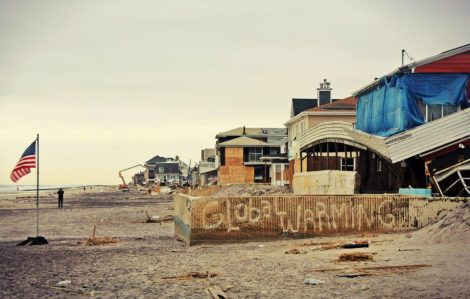The Eastern Seaboard is still limping toward recovery post-Superstorm Sandy. Just as the government was really getting rolling distributing $60 billion in federal aid that was authorized in January, that amount was chopped by 5 percent thanks to sequestration.
And now comes news that some of that rebuilding money is being spent not-so-wisely. While San Francisco is trying to make a “managed retreat” from rising seas, the tri-state area seems to be more in favor of a “whatevs, fuck it” approach. ProPublica reports:
A WNYC and ProPublica analysis of federal data shows at least 10,500 home and business owners have been approved for $766 million in SBA [Small Business Administration] disaster loans to rebuild in areas that the government now says could flood again in the next big storm. The data, which shows loans approved through mid-February, was obtained via a Freedom of Information Act request.
More loans could be going to flood-prone areas. The analysis did not cover Long Island or Connecticut.
The loans require borrowers to get flood insurance, which in turn could encourage some to rebuild properties to be more flood-resistant. However, for many owners there’s no requirement they raise their properties to the heights FEMA recommends.
The result: the federal government is helping people rebuild despite the risk that flooding will again destroy the properties.
ProPublica talked with folks who plan to rebuild but can’t afford to raise their properties to better withstand future storm surges. Post-Sandy, FEMA released new maps of areas the agency deems at risk of flooding, where buildings should be raised or, well, razed.

New York TimesRevamped flood zones in Staten Island and Brooklyn. Click to embiggen.
But in total, ProPublica reports, 83 percent of loans in New York City went to rebuild properties in those flood zones; in New Jersey, the figure was 71 percent.
The SBA says it’s not their job to assess whether it’s smart to build in flood-prone areas.
“Our mission is to help these homeowners and business become whole again,” said Carol Chastang, an SBA spokeswoman. “We really aren’t in a position to tell people where or where not to rebuild.” …
Environmental groups like the National Wildlife Federation say the best flood protection are wetlands and to leave stretches of the coast undeveloped.
“Ideally we’re going to help people move away from the flood zone and not give them assistance to rebuild exactly as is,” said Joshua Saks, the federation’s legislative director. “But we recognize it’s a very personal decision, it’s a local decision.”
It’s a personal decision for folks like the owners of the private Fairfield Beach Club, which received the biggest loan yet of $1.5 million. “If we really wanted to avoid future damage we’ve got to close the club and move inland two or three miles,” Arthur McCain, a member of the club’s finance committee, told ProPublica.
This isn’t just about private clubs, though — it’s about peoples’ homes and lives. If there’s no immediate incentive and aid to plan ahead for rising seas and storm surges, to move inland, then what else can we expect people to do?




